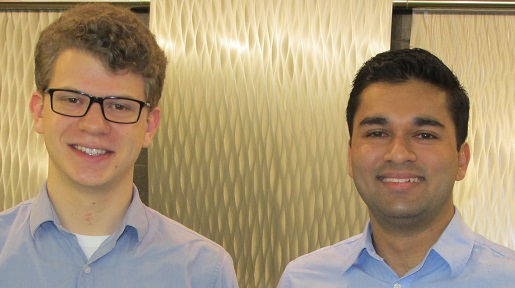 Congratulations to Tyler and Soumya for achieving this distinguished award! The University Scholar Program is one of the most prestigious programs for undergraduates at the University of Connecticut. The program allows students to design and pursue an in-depth research or creative project and to craft an individualized plan of study that supports their intellectual interests during their final three semesters. Each student is mentored by an advisory committee of three faculty.
Congratulations to Tyler and Soumya for achieving this distinguished award! The University Scholar Program is one of the most prestigious programs for undergraduates at the University of Connecticut. The program allows students to design and pursue an in-depth research or creative project and to craft an individualized plan of study that supports their intellectual interests during their final three semesters. Each student is mentored by an advisory committee of three faculty.
According to Tyler Daddio, “the recent revitalization of the field of cancer immunotherapy has brought with it prospects of personalized cancer vaccines. One promising approach to the design of these vaccines involves the clever use of our own T cells (a type of white blood cell) to recognize and eliminate tumor cells. The idea is relatively simple: identify mutations unique to the tumor, identify the T cells in the patient that recognize those mutations, and increase the population of these T cells so to elicit an immune response. Tools like EpiSeq, developed jointly by the labs of Dr. Ion Mandoiu of the CSE department and Dr. Pramod Srivastava of UConn Health, produce extensive lists of such mutations, however many of them fail to elicit an immune response in vivo for various reasons. My University Scholar project aims to develop and test a bioinformatics pipeline to algorithmically narrow down this selection of mutations by taking into account the repertoire of T cell specificities of each patient. Results in the positive would provide further insight into the effective development of these personalized cancer vaccines, however negative results may open doors to differing approaches not previously considered. Regardless of the outcome, I am overjoyed to have the opportunity to pursue this research under the guidance of my mentors, Dr. Mandoiu, Dr. Srivastava, and Dr. Munteanu.”
Soumya Kundu shared his research project with us as follows, “the goal of my University Scholar project is to construct a probabilistic framework to simulate the evolution of genes and gene families. The new framework will expand upon the capabilities of existing frameworks and will be used to generate more biologically realistic data sets of species trees, gene trees, and gene sequences, which in turn can be used to compare and characterize the accuracy of the computational methods used to reconstruct evolutionary histories of genes and species. One of the specific goals of this project is to help biologists temporally orient, or root, gene trees. This will allow them to construct more accurate evolutionary histories and properly understand how genes and species evolve, and in turn will directly benefit our understanding of biology.
I am really excited to have received this opportunity to not only work on a project that has the potential to have significant interdisciplinary impact, but also work with three great professors who can provide me with valuable advice to help me complete this project and become a better researcher. These three professors are Dr. Mukul Bansal (CSE), Dr. Ion Mandoiu (CSE), and Dr. J. Peter Gogarten (MCB). They are the members of my University Scholar Advisory Committee, and Professor Bansal is the chair of that committee. Currently, I am finishing my work on my Summer Undergraduate Research Fund (SURF) Award project on investigating the impact of alternative optimal gene tree rootings on phylogenetic reconciliation with Professor Bansal at the Computational Biology Laboratory.”